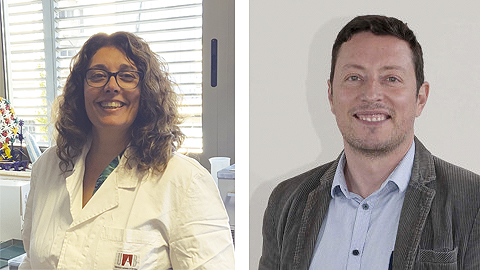UAB researchers take part in two CaixaResearch 2022 selected projects
Júlia Lorenzo, researcher at the Institute of Biotechnology and Biomedicine (IBB) and the Department of Biochemistry and Molecular Biology, and Raül Andero, ICREA researcher at the Institut de Neurociències (INc), are involved in two projects funded by this year's CaixaResearch call for health research projects. One will be studying nanotechnology to stop the advancement of Parkinson's disease while the other will focus on how gut microbiota can control food intake in cases of obesity.

As director of the Protein Engineering and Nanomedicine Lab at the IBB-UAB, Julia Lorenzo will be leading one of the parts of the “New nanotechnological therapy for Parkinson´s disease: nose to brain” project, which includes Marta Martínez-Vicente from the Vall d’Hebron Research Institute (VHIR) as the main researcher and María Jesús Vicent from the Príncipe Felipe Research Centre (CIPF), as the director of the consortium's third sub-project.
The study, with almost 600,000 euros in funding, aims to create innovative technology for the treatment of Parkinson's disease, based on the GBA enzyme. Researchers demonstrated that in animal models, when the function of this enzyme is restored, neurodegeneration can be prevented and the disease's symptoms improved. Now, researchers are looking into ways to transport the GBA using intranasal delivery to the brain thanks to a techology based on polymeric nano conjugates, which would allow breaking the blood-brain barrier, the largest limitation to using this treatment.
Lorenzo and her team are specialists in the design and validation of nanomaterials for biomedical purposes related to the treatment and diagnosis of brain diseases. Her main objective is to develop intranasal drug delivery strategies for patients with glioblastomas and Parkinson's disease.
Raül Andero, director of the Translational Mechanisms of Fear Memory Lab at the INc, will be working on a project focusing on gut microbiota and its effects on obesity: “La microbiota intestinal influeix en la pèrdua de control de la ingesta en l’obesitat?”, The study will be led by Rafael Maldonado from the NeuroPhar-MELIS (Pompeu Fabra University) and will also include another member of the consortium, José Manuel Fernández-Real, from the Girona Biomedical Research Institute (University of Girona).
The research will delve into the study of the behaviour of overweightness and obesity. These metabolic diseases are often associated with complex alterations which lead to a loss of behaviour control and cause weight gain. Researchers will study which environmental factors affect brain functions and lead to a loss of control over hunger, with a specific focus on the epigenetic mechanisms mediated by the gut's microbiota. The study aims to identify new biomarkers indicating a higher risk in losing control over hunger and pave the way for new therapies in this field.
Andero and his team analyse in real-time hundreds of mouse neurons in relation to their behaviour during eating by using an innovative technique known as miniscopes. Their study will help to improve the understanding of why some individuals develop food addicitons while others do not.